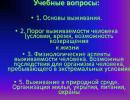Reichstag of Worms condemning Luther. Key dates in world history. Excommunication
Preparation for the Unified State Exam-2017
476 - fall of the Western Roman Empire;
527-565 - the reign of Justinian in the Byzantine Empire;
VII - the emergence of Islam;
768-814 - proclamation of Charlemagne as emperor;
843 - the collapse of the Frankish Empire;
962 - formation of the Holy Roman Empire;
1054 - division of the Christian Church into Eastern (Orthodox) and Western (Catholic);
1066-1072 - Norman conquest of England;
1096-1291 - Crusades;
1204 - the capture of Constantinople by the crusaders;
1215 - the adoption of the Magna Carta in England;
1265 - the emergence of the English Parliament;
1302-1789 - convocation of the Estates General in France;
1337-1453 - Hundred Years War;
1358 - Jacquerie in France;
1381 - an uprising led by W. Tyler in England;
1389 - battle on the Kosovo field; 1419-1434 - Hussite wars;
1448-1455 - the invention of printing by I. Gutenberg;
1455-1485 - War of the Scarlet and White Roses in England;
1461-1483 - the reign of Louis XI in France;
1453 - fall of the Byzantine Empire;
1485-1509 - reign of Henry VII in England;
1492 - discovery of America by Christopher Columbus;
1492 - completion of the Reconquista in the Iberian Peninsula;
1497-1499 - Vasco da Gama discovered the sea route to India;
1517 - speech by M. Luther with 95 theses, the beginning of the Reformation in Germany;
1519-1522 - circumnavigation of the expedition of F. Magellan;
1521 - Reichstag of Worms. Condemnation of M. Luther;
1524-1526 - Peasants' War in Germany;
1550s - the beginning of the Reformation in England;
1555 - Augsburg religious world;
1562-1598 - religious wars in France;
1568-1648 - liberation war in the Netherlands (Netherlands Revolution);
1569 - formation of the Commonwealth;
1572 - Bartholomew night in France;
1579 - Union of Utrecht;
1588 - the defeat of the Invincible Armada by England;
1685 - Edict of Nantes by Henry IV of France;
1618-1648 - Thirty Years' War;
1624-1652 - the activities of Cardinal Richelieu as the first minister of France;
1641 - the beginning of the Long Parliament in England, the beginning of the English bourgeois revolution;
1641 - the adoption of the "Great Remonstrance" by the English Parliament;
1642-1651 - Civil War in England;
1643-1715 - reign french king Louis XIV;
1648 - Peace of Westphalia;
1649 - execution English king Charles I;
1649 - proclamation of England as a republic;
1653-1659 - O. Cromwell's protectorate;
1660 - restoration of the Stuart dynasty in England;
1688 - "Glorious Revolution" in England;
1715-1774 - the reign of Louis XV in France;
1740-1786 - reign of Frederick II the Great in Prussia;
The second half of the 18th - the first quarter of the 19th - the Luddite movement in England;
1773 - "Boston Tea Party";
1776 - adoption of the US Declaration of Independence;
1787 - adoption of the US constitution;
1789 - the beginning of the Great french revolution;
1789 - adoption of the Declaration of the Rights of Man and Citizen;
1791 - adoption of the Bill of Rights in the United States; 1789-1797 - Presidency of George Washington in the USA;
1792 - the collapse of the monarchy in France;
1792 - execution of King Louis XVI in France;
1793 - coming to power in France of the Jacobins 1796-1797 - Italian campaign of Napoleon Bonaparte;
1798-1801 - Napoleon Bonaparte's Egyptian campaign;
1799 - Napoleon Bonaparte's coup d'état on 18-19 Brumaire;
1804 - Proclamation of Napoleon as Emperor of France;
1805 - III anti-French coalition;
1806 - IV anti-French coalition; 1809 - V anti-French coalition;
1813-1814 - V anti-French coalition
1814 - abdication of Napoleon;
1815 - Battle of Waterloo;
1823 - proclamation of the Monroe Doctrine in the United States;
1836-1848 - Chartist movement in England;
1849-1849 - "spring of peoples": revolutions in European countries;
1861-1865 - American Civil War;
1861 - unification of Italy;
1862-1890 - Bismarck's activities at the head of Prussia and Germany;
1868-1889 - Meiji revolution in Japan;
1870-1871 - Franco-Prussian War;
1871 - proclamation of Germany as an empire;
1879-1882 - creation tripartite alliance(Germany, Austria-Hungary and Italy);
1904 - creation of the Entente (Russia, England and France);
1912-1913 - Balkan Wars;
1914 - "Sarajevo Incident", the assassination of the heir to the Austrian throne, Archduke Franz Ferdinand
1919-1921 - Paris peace conference;
1919 - establishment of the League of Nations;
1921 - 1922 - Washington Conference;
1922 - the coming of the Nazis to power in Italy;
1929-1933 - world economic crisis, "great depression";
1934 - Hitler's coming to power in Germany;
1930s - F. Roosevelt's "New Deal" in the USA;
1936-1939 - Spanish Civil War;
1936 - Anti-Comintern Pact of Germany and Japan;
1938 - capture of Austria Nazi Germany(Anschluss);
1938 - signing of the Munich Agreement;
1939-1945 - Second World War;
1941 - Japanese attack on Pearl Harbor and US entry into the war;
List major events, processes and phenomena
history of foreign countries
(according to the 2017 codifier)
476 − fall of the Western Roman Empire
486 g. - the emergence of the state of the Franks
527 −565 gg. − rule of Justinian in the Byzantine Empire
610 d. Rise of Islam
632 g. - the emergence of the state among the Arabs
800 - Proclamation of Charlemagne as Emperor
843 d. - collapse of the Frankish Empire
962 d. - Formation of the Holy Roman Empire
1054 - division of the Christian Church into Eastern (Orthodox) and Western (Catholic)
1066 − Norman Conquest of England (Battle of Hastings)
1096 − first half of 1270s gg. /1291 / beginningXIVcenturies (different versions end of era)− Crusades
1204 d. − capture of Constantinople by the crusaders
1215 - adoption of the Magna Carta in England
1265 d. - the emergence of the English Parliament
1302 d. - convocation of the Estates General in France
1337 −1453 gg. − Hundred Years War
1358 - Jacquerie in France
1381 - Uprising led by W. Tyler in England
1389 d. - Battle of Kosovo
1419−1434 gg. − Hussite wars
1440sgg. − the invention of printing by J. Gutenberg
1455−1485 gg. − War of the Scarlet and White Roses in England
1461−1483 gg. − reign of Louis XI of France
1453 - fall of the Byzantine Empire
1485−1509 gg. − reign of Henry VII in England
1492 - discovery of America by Christopher Columbus
1492 d. - completion of the Reconquista in the Iberian Peninsula
1497−1499 gg. − opening of the sea route to India by Vasco da Gama
1517 - speech by M. Luther with 95 theses, the beginning of the Reformation in Germany
1519−1522 gg. − circumnavigation of the expedition of F. Magellan
1521 city - Reichstag of Worms. Condemnation of M. Luther
1524−1525 (1526) − Peasant War in Germany
1534 - the beginning of the Reformation in England
1555 - Augsburg Religious Peace
1562−1598 gg. − religious wars in France
1566−1609 gg. − liberation war in the Netherlands
1569 d. - formation of the Commonwealth
1572 - St. Bartholomew's Night in France
1579 - Union of Utrecht
1588 - the defeat of the Invincible Armada by England
1598 − Edict of Nantes by Henry IV of France
1618−1648 gg. − Thirty Years' War
1624−1642 gg. − activities of Cardinal Richelieu as the first minister of France
1640 d. - the beginning of the activities of the Long Parliament in England, the beginning of the English
bourgeois revolution
1641 d. - adoption by the English Parliament of the "Great Remonstrance"
1642−1649 (sometimes early 1650 - X) gg. − civil war in England
1643−1715 gg. - the reign of the French king Louis XIV
1648 d. − Peace of Westphalia
1649 d. − execution of the English King Charles I
1649 - Proclamation of England as a republic
1653−1659 gg. − protectorate of O. Cromwell
1660 - restoration of the Stuart dynasty in England
1688 d − "Glorious Revolution" in England
1715−1774 gg. − reign of Louis XV in France
1740−1786 gg. − reign of Frederick II in Prussia
1810sgg. − Luddite movement in England
1773 - "Boston Tea Party"
1776 d. − adoption of the US Declaration of Independence
1787 d. - adoption of the US constitution
1789 - the beginning of the revolution in France
1789 d. − adoption of the Declaration of the Rights of Man and of the Citizen
1791 d. - Adoption of the US Bill of Rights
1789−1797 gg. − presidency of George Washington in the USA
1792 city - start revolutionary wars France
1792 - the collapse of the monarchy in France
1793 - coming to power in France of the Jacobins
1793 d. − Execution of King Louis XVI in France
1796−1797 gg. − Italian campaign of Napoleon Bonaparte
1798 - Egyptian campaign of Napoleon Bonaparte
1799 − The coup d'état of Napoleon Bonaparte 18-19 Brumaire
1804 d. − Proclamation of Napoleon Emperor of France
1799−1815 gg. − Napoleonic Wars
1814 - the overthrow of Napoleon
March − July 1815 - "Hundred Days" of Napoleon
1823 d. - proclamation of the Monroe Doctrine in the United States
1830 - July Revolution in France
1830−1840sgg. − Chartist movement in England
1849-1849 - "spring of peoples": revolutions in European countries
1861−1865 gg. − American Civil War
1861 - the unification of Italy (since 1870 with the capital in Rome)
1862−1890 gg. − activities of Bismarck at the head of Prussia and Germany
1868−1889 − Meiji revolution in Japan
1870−1871 gg. − franco − prussian war
1871 d. - Proclamation of the German Empire
1882 d. − Creation of the Triple Alliance (Germany, Austria - Hungary and Italy)
1904−1907 gg. − creation of the Entente (Russia, England and France)
1912, 1913 gg. − Balkan wars
June 28 1914 - "Sarajevo Incident", the assassination of the heir to the Austrian throne, Archduke Franz Ferdinand
1914−1918 gg. − World War I
November 1918 G. - August 1919 gg. − November Revolution in Germany
January 1919 - January 1920 − Paris Peace Conference
1919 - Establishment of the League of Nations
November 1921 G. - February 1922 d. - Washington Conference
1922 - the rise of the Nazis to power in Italy
1929−1933 gg. − global economic crisis, "great depression"
January 1933 d. - Hitler's rise to power in Germany
1933−1936 gg. − “New Deal” of F. Roosevelt in the USA
1936−1939 gg. − fascist rebellion and civil war in Spain
1936 − Anti-Comintern Pact of Germany and Japan
1938 - occupation of Austria by Nazi Germany (Anschluss)
1938 d. − signing of the Munich Agreement
1939−1945 gg. − World War II
December 7 1941 d. − Japanese attack on Pearl − Harbor and US entry into the war
June 6 1944 g. - landing of the Anglo − American troops in Normandy. Opening of the Second Front
August 6, 9 1945 - US atomic bombing of Hiroshima and Nagasaki
September 2 1945 the surrender of Japan. End of World War II
20 November 1945 − October 1 1946 gg. − Nuremberg trials of Nazi criminals
1949 d.- Formation of HATO
1949 d. Proclamation of the People's Republic of China
1959 d. - victory of the revolution in Cuba
1965−1973 gg. − US war in Vietnam
1966−1976 gg. − "Cultural Revolution" in China
1989 - "velvet" revolutions in the countries of Central and Eastern Europe
1990 g. - unification of the GDR and the FRG
Subscribe and stay tuned for new publications in my Vkontakte community " History of the exam and the cat Stepan
Reformation - a broad religious and socio-political movement in Western and Central Europe of the 16th - early 17th centuries, aimed at reforming Catholic Christianity in accordance with the Bible.
Its beginning is considered to be the speech of Martin Luther, doctor of theology at Wittenberg University: on October 31, 1517, according to legend, he nailed his “95 Theses” to the doors of the Wittenberg Castle Church, in which he opposed the existing abuses of the Catholic Church, in particular against the sale of indulgences.
Circumnavigation of the expedition of F. Magellan -1519-1522.

The Spanish sea expedition led by Ferdinand Magellan began on September 20, 1519 and ended on September 6, 1522. Only one ship managed to return to Spain.
...................................................................................................................................................................................
Reichstag of Worms. Condemnation of M. Luther-1521.
 Reichstag of Worms - meeting of the Reichstag in 1521, assembled by Emperor Charles V in 1521 in the city of Worms.
Reichstag of Worms - meeting of the Reichstag in 1521, assembled by Emperor Charles V in 1521 in the city of Worms.
One of the topics on the agenda was the consideration of the teachings of Martin Luther. At the end of the Diet of Worms, Martin Luther was declared a heretic and a criminal.
..................................................................................................................................................................................
Peasant War in Germany 1524-1526

The Peasant War in Germany is a popular uprising in central Europe, primarily on the territory of the Holy Roman Empire of the German nation in 1524-1526. The Peasants' War was the largest popular uprising in Europe before the French Revolution.
…………………………………………………………………………………………………………………………………………………………………………………………………………….
Beginning of the Reformation in England 1534.
In 1534, Parliament passed a law declaring the king head of the church in England. Thus began the Reformation, it began not at the request of the people "from below", as in Germany, but "from above" at the will of the king.
…………………………………………………………………………………………………………………………………………………………………………………………………………..
Peace of Augsburg 1555
Agreement concluded in 1555 at the Reichstag in Augsburg. The Peace of Augsburg recognized Lutheranism as the official religion and established the right of the estates to choose their religion. The terms of the agreement formed the basis state structure Holy Roman Empire of the German nation and ensured the restoration of political unity and stability in Germany during the second half of the 16th century.
……………………………………………………………………………………………………………………………………………………………………………………………………………
Religious wars in France (Huguenot wars) - 1562-1598.
Religious wars (Huguenot wars) - wars in France between Catholics and Calvinists (Huguenots) in the 2nd half of the 16th century. Contemporaries called them civil wars.
War of Liberation in the Netherlands (Netherlands Revolution) - 1566-1609.
 The Dutch revolution is called the liberation war of the Netherlands against the rule of Spain in the second half of the 16th - early 17th centuries. (1566–1609).
The Dutch revolution is called the liberation war of the Netherlands against the rule of Spain in the second half of the 16th - early 17th centuries. (1566–1609).
As a result of this war, the Netherlands was divided into the independent Republic of the United Provinces (Holland) and the Spanish Southern Netherlands (modern Belgium).
…………………………………………………………………………………………………………………………………………………………………………………………………………….
Formation of the Commonwealth-1569.
The Commonwealth is a federation of the Kingdom of Poland and the Grand Duchy of Lithuania, which arose as a result of the Union of Lublin in 1569 and was liquidated in 1795 with the division of the state between Russia, Prussia and Austria.
…………………………………………………………………………………………………………………………………………………………………………………………………………….
Why in this ancient city The world's largest monument to the Reformation was erected on the Rhine?
-
Reichstag of Worms

Founder of the Reformation

Monument to Luther

Answering the Emperor

Agenda

Excommunication

Frederick III the Wise

Accompanied by a herald

Arrival at the Reichstag

"That's where I stand and I can't do otherwise"

Edict of Worms

imperial disgrace


In a workshop

predecessors

Allegorical images

Fortress of Faith

Our sword, bulwark and shield
-
Reichstag of Worms
This event is considered one of the key events in the history of the Reformation. On April 17-18, 1521, the 37-year-old Augustinian monk and doctor of theology from Wittenberg, Martin Luther, appeared before the Holy Roman Emperor Charles V and other participants in the Reichstag held in Worms. He was called here, demanding to publicly renounce his views - heretical from the point of view of the Catholic Church.

Founder of the Reformation
Luther was expected to renounce 95 theses, which contained, in particular, criticism of the sale of indulgences and called into question the spiritual authority of the pope. Luther hung them on the door of the Castle Church in Wittenberg in 1517, offering to discuss them publicly, and later developed the ideas in his writings. Before the Reichstag, he declared that only evidence from the Gospel and reasonable arguments could convince him.

Monument to Luther
In Worms, Luther did not renounce his views, which meant his final break with the Catholic Church and became the impetus for the emergence of the Protestant movement in the German lands. The Luther Monument (Lutherdenkmal), erected in this city in 1868, is the largest Reformation monument in the world along with the 100-meter Reformation Wall in Geneva.

Answering the Emperor
The monument was erected near the place where near the cathedral was the residence of the Bishop of Worms, in which Martin Luther spoke before the Reichstag. Where Luther stood, answering the emperor and representatives of the imperial estates, a commemorative plate was later laid on the ground - in the park, laid out after the destruction of the residence during the War of Palatinate Succession.

Agenda
The Reichstag of 1521 opened at the end of January and lasted four months. In view of the growing Turkish threat, the main items on the agenda were the creation of an imperial government and the distribution of responsibilities for the deployment of military contingents. Meetings were usually held in the city hall, but the hearings on Luther's case were moved to another place so as not to give him a wide rostrum.

Excommunication
A few months before Luther's summons to Worms, Pope Leo X excommunicated him from the church. According to the rules then in force, this immediately entailed imperial disgrace, that is, Luther was declared a state criminal. However, his ideas were already widespread, and the princes who sympathized with him insisted that Luther be heard in the Reichstag before the disgrace took effect.

Frederick III the Wise
Given Luther's growing popularity, the emperor agreed to hear him, giving him the opportunity to renounce the heresy. Among the German princes who sought to weaken the influence of the pope, the key role was played by the Saxon elector Frederick III the Wise, who later sheltered Luther in the Wartburg castle, where he translated into contemporary German New Testament. At Worms, this elector stands at Luther's right hand.

Accompanied by a herald
On the way to Worms, the faithful gave Luther enthusiastic meetings. In Erfurt, Gotha and Eisenach he delivered sermons. A special charter of Charles V guaranteed him freedom and immunity for three weeks. The imperial herald, who accompanied Luther from Wittenberg to the Reichstag, was responsible for its observance.

Arrival at the Reichstag
Luther arrived at Worms on April 16, 1521. Residents took to the streets. There was great interest in him. Since Luther had already formally been excommunicated from the church, he could not stay with his brothers in the order in the local Augustinian monastery. He was given a room in the courtyard, which was occupied by a delegation accompanying the Saxon elector.

"That's where I stand and I can't do otherwise"
The archives preserved the notes made by Luther during the preparation for the speech, but the most famous was his phrase, which he actually did not pronounce in this form in Worms: "I stand there and cannot do otherwise" ("Hier stehe ich und kann nicht anders"). Capacious and aphoristic, it conveys the essence of Luther's statements, therefore it has become widespread. This quote was placed on the monument.

Edict of Worms
Leaving the Reichstag, Luther exclaimed: "Ich bin hindurch!" - with obvious relief that everything is already behind him and his business in Worms is over. From the hall in which the hearings were held, he came out a free man, since the validity of the safe-conduct has not yet expired. On April 25, Luther set out on his return journey. The Edict of Worms, declaring him an Imperial criminal, will be issued in a month.

imperial disgrace
The edict, signed by Charles V under the pressure of the papal nuncio, also forbade the publication of Luther's works, reading them, and providing asylum to the "heretic". By the time the decree was issued, the princes and representatives of the free cities who sympathized with Luther had already left Worms. In early May, Luther was secretly brought to Wartburg Castle to hide from persecution, but that's another story.

Grand opening of the monument
On June 25, 1868, more than 20,000 people gathered for the opening of the Luther monument. The most important Protestant ruling houses of Europe sent delegations to Worms. Prussia was represented by the future German Emperor Wilhelm I. The monument was made in the classical style according to the design of the sculptor Ernst Rietschel, the author of the famous monument to Goethe and Schiller in Weimar.

In a workshop
This engraving from 1867 shows a workshop with a pedestal decorated with bas-reliefs and inscriptions. On the left - the figure of Luther, on the right - an unfinished image of his closest associate Philip Melanchthon. His place at the pedestal with a raised hand has already taken the Florentine monk Savonarola, who criticized the papacy and was burned in 1498 - one of a kind of harbingers of the Reformation.

predecessors
In addition to Savonarola, this group includes sculptural images of Jan Hus, the ideologist of the Czech Reformation, sitting near the pedestal; translation of the Bible into Middle English.

Allegorical images
In addition to Luther, his predecessors and associates, the monument in Worms, with its allegorical images, recalls some events and cities - for example, about Augsburg, where the Augsburg religious peace between the Catholic and Lutheran subjects of the Holy Roman Empire was concluded at the Reichstag of 1555.

Fortress of Faith
Ernst Ritschel, the author of the monument, died in 1861. The project according to his sketches was completed by colleagues and students. The monument outwardly resembles a medieval castle with the main and side towers - the pillars of faith, that is, Luther in the center and the figures of Frederick III the Wise, Philip Melanchthon, as well as the philosopher Johann Reuchlin and the Hessian Landgrave Philip I the Magnanimous, placed in the corners.

Our sword, bulwark and shield
The idea for the monument is based on a key quote from Luther's popular evangelical hymn "Ein feste Burg ist unser Gott" (literally: "The unshakable castle is our God"), written by Luther in 1529. In Russian, this line from the anthem is known in several translations. One of them is "The Lord is our sword, bulwark and shield". In 2017, Germany will celebrate the 500th anniversary of the Reformation.
List of the most important events (processes, phenomena) in the history of foreign
countries whose knowledge can be tested in tasks 1 and 11 of the USE 2016
476 - fall of the Western Roman Empire
5th century - the emergence of the state of the Franks
527-565 − rule of Justinian in the Byzantine Empire
early 7th century − emergence of Islam
7th century - the emergence of the state among the Arabs
800 - Proclamation of Charlemagne as Emperor
843 - collapse of the Frankish Empire
962 - formation of the Holy Roman Empire
1054 - division of the Christian Church into Eastern (Orthodox) and Western (Catholic)
1066 Norman conquest of England
1096 - 1204 − Crusades
1204 - the capture of Constantinople by the crusaders
1215 - the adoption of the Magna Carta in England
1265 - the emergence of the English Parliament
1302 - convocation of the Estates General in France
1335-1573 − Hundred Years War
1358 - Jacquerie in France
1381 - an uprising led by W. Tyler in England
1419-1434 − Hussite wars
1440-1450 − the invention of printing by J. Gutenberg
1455-1485 − War of the Scarlet and White Roses in England
1461-1483 − reign of Louis XI of France
1453 - fall of the Byzantine Empire
1485-1509 − reign of Henry VII in England
1492 - discovery of America by Christopher Columbus
1492 - completion of the Reconquista in the Iberian Peninsula
1498 - Vasco da Gama discovered the sea route to India
1517 - speech by M. Luther with 95 theses, the beginning of the Reformation in Germany
1519-1522 − circumnavigation of the expedition of F. Magellan
1521 - Reichstag of Worms. Condemnation of M. Luther
1524-1526 − Peasant War in Germany
1509 - the beginning of the Reformation in England
1555 - Peace of Augsburg
1562-1598 − religious wars in France
1566-1609 − liberation war in the Netherlands
1569 - formation of the Commonwealth
1579 − Union of Utrecht
1588 - the defeat of the Invincible Armada by England
1598 - Edict of Nantes by Henry IV of France
1618-1648 − Thirty Years' War
1624-1642 − activities of Cardinal Richelieu as the first minister of France
1640 - the beginning of the Long Parliament in England, the beginning of the English bourgeois revolution
1641 - the adoption of the "Great Remonstration" by the English Parliament
1642-1651 − civil war in England
1661-1715 - the reign of the French king Louis XIV
1648 Peace of Westphalia
1649 - execution of the English king Charles I
1649 − Proclamation of England as a republic
1653-1659 − protectorate of O. Cromwell
1660 - Restoration of the Stuart dynasty in England
1688-1689 − "Glorious Revolution" in England
1715-1774 − reign of Louis XV in France
1740-1786 − reign of Frederick II in Prussia
1811, I quarter of the 19th century − Luddite movement in England
1773 Boston Tea Party
1787 - adoption of the US constitution
1789 - the beginning of the revolution in France (1789)
1791 - adoption of the Bill of Rights in the United States
1789-1797 − presidency of George Washington in the USA
1792 - the beginning of the revolutionary wars of France
1791 - the collapse of the monarchy in France
1793 - Jacobins come to power in France
1796-1797 − Italian campaign of Napoleon Bonaparte
1798-1801 − Egyptian campaign of Napoleon Bonaparte
1799 − Coup d'état of Napoleon Bonaparte 18–19 Brumaire
1804 - Proclamation of Napoleon as Emperor of France
1799-1804 − Napoleonic Wars
1814 - Overthrow of Napoleon
March-June 1815 - Napoleon's "Hundred Days"
1823 - Proclamation of the Monroe Doctrine in the United States
1836-1848 − Chartist movement in England
"spring of nations": revolutions in European countries (1848–1849)
1861-1865 − American Civil War
1848-1870 − unification of Italy
1871-1890 − activities of Bismarck at the head of Prussia and Germany
1868-1889 − Meiji revolution in Japan
1870-1871 - Franco-Prussian War
1871 - Proclamation of the German Empire
1882 - Creation of the Triple Alliance (Germany, Austria-Hungary and Italy)
1904 - creation of the Entente (Russia, England and France)
1912-1913 − Balkan wars
June 28, 1914 - "Sarajevo Incident", the assassination of the heir to the Austrian throne, Archduke Franz Ferdinand
1914-1918 − World War I
1918 - Revolution in Germany (1918)
1919 - Paris Peace Conference (1919-1920)
1919-1920 − establishment of the League of Nations
1921-1922 1- Washington Conference
1922 - Fascists come to power in Italy
1929-1932 − global economic crisis, "great depression"
1933 - Hitler's rise to power in Germany
1933 - F. Roosevelt's "New Deal" in the USA
1936-1939 − fascist rebellion and civil war in Spain
1936 - Anti-Comintern Pact of Germany and Japan
1938 - occupation of Austria by Nazi Germany (Anschluss)
1938 - signing of the Munich Agreement
1939-1945 − World War II
June 1944 - landing of Anglo-American troops in Normandy. Opening of the Second Front
August 1945 - US atomic bombing of Hiroshima and Nagasaki
1945-1946 − Nuremberg trials of Nazi criminals
1949 - formation of HATO
1959 - the victory of the revolution in Cuba
1965-1975 − US war in Vietnam
1966-1976 − "Cultural Revolution" in China
Late 1980s - early 1990s − "velvet" revolutions in the countries of Central and Eastern Europe
1990 - unification of the GDR and the FRG






